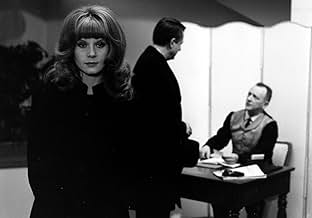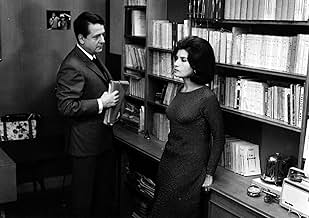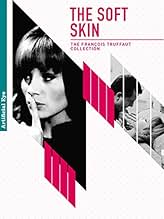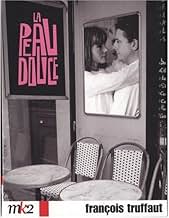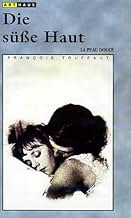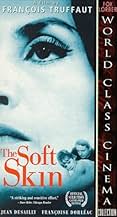IMDb-BEWERTUNG
7,5/10
8811
IHRE BEWERTUNG
Pierre Lachenay ist ein bekannter Verleger und Dozent, verheiratet mit Franca und Vater von Sabine, um die 10 Jahre alt. Dann lernt er die Stewardess Nicole kennen.Pierre Lachenay ist ein bekannter Verleger und Dozent, verheiratet mit Franca und Vater von Sabine, um die 10 Jahre alt. Dann lernt er die Stewardess Nicole kennen.Pierre Lachenay ist ein bekannter Verleger und Dozent, verheiratet mit Franca und Vater von Sabine, um die 10 Jahre alt. Dann lernt er die Stewardess Nicole kennen.
- Regie
- Drehbuch
- Hauptbesetzung
- Auszeichnungen
- 1 Gewinn & 2 Nominierungen insgesamt
Françoise Dorléac
- Nicole
- (as Françoise Dorleac)
Carnero
- Lisbon organizer
- (Nicht genannt)
Georges de Givray
- Le père de Nicole
- (Nicht genannt)
Catherine-Isabelle Duport
- Jeune fille Reims
- (Nicht genannt)
Maximiliènne Harlaut
- Mme. Leloix
- (Nicht genannt)
Charles Lavialle
- Veilleur hôtel Michelet
- (Nicht genannt)
Empfohlene Bewertungen
Truffaut's study of a middle-aged man losing his way in life in the age-old fashion is caught in a mesmerizing series of quick-succession shots and sympathetically-captured quotidian details. An unthinking, self-assured man; his wounded, passionate wife; his sweet, vulnerable lover; an inevitable tragedy. This underrated film has no real surprises, but its sure-footedness is impressive and the simple story ultimately very moving.
French drama from writer-director Francois Truffaut. A respected author and lecturer (Jean Desailly) has an affair with a young stewardess (Francoise Dorleac).
I believe this film is deeply personal for Truffaut. He has several films about male protagonists who cheat on their wives or girlfriends (Bed and Board and The Man Who Loved Women, for example). What I like best about The Soft Skin is precisely that the affair happens because the stewardess is impressed to get involved with a minor celebrity, and he sleeps with her mainly because he can. They don't "fall in love" with each other; it's an adultery story, not a love story. Because the emotional involvement of the characters isn't very great, neither is the involvement of most of the audience. I will infer that Truffaut had more than one fling like this, but had no insight into why he did this. The subject is personal, but nothing about the presentation helped to alleviate that paucity of engagement.
Two other points: 1) Truffaut's films tend to be very one-paced. They don't usually quicken, slow down, speed up, etc. They proceed pretty much at the same pace from beginning to end. This is a real limitation. 2) I have come to believe that as much as Truffaut loved Hitchcock's films, as a director he learned absolutely nothing from him. Hitchcock is a master of pacing. The best moments in Truffaut's films usually come from a realist aesthetic that is the opposite of Hitchcock's master manipulation of genre and audience.
I believe this film is deeply personal for Truffaut. He has several films about male protagonists who cheat on their wives or girlfriends (Bed and Board and The Man Who Loved Women, for example). What I like best about The Soft Skin is precisely that the affair happens because the stewardess is impressed to get involved with a minor celebrity, and he sleeps with her mainly because he can. They don't "fall in love" with each other; it's an adultery story, not a love story. Because the emotional involvement of the characters isn't very great, neither is the involvement of most of the audience. I will infer that Truffaut had more than one fling like this, but had no insight into why he did this. The subject is personal, but nothing about the presentation helped to alleviate that paucity of engagement.
Two other points: 1) Truffaut's films tend to be very one-paced. They don't usually quicken, slow down, speed up, etc. They proceed pretty much at the same pace from beginning to end. This is a real limitation. 2) I have come to believe that as much as Truffaut loved Hitchcock's films, as a director he learned absolutely nothing from him. Hitchcock is a master of pacing. The best moments in Truffaut's films usually come from a realist aesthetic that is the opposite of Hitchcock's master manipulation of genre and audience.
This Truffaut is more old cinema than new wave:Jean Desailly is unusual in ""Jules et Jim" director's universe.He's certainly one of the greatest French actors I know but he's better with Jean Delannoy or Edouard Molinaro.Truffaut's touch is here anyway:you can feel it thru the father/daughter relationship,during the scene when Desailly brings a classical music record to his little girl .The breakfast trail which the cat finds on this way will be here again in "la nuit américaine " (day for night).A lot of details show the cine buff Truffaut was,notably the restaurant called "la Colinière" the name of the mansion in Jean Renoir's "la règle du jeu";the room 813 is probably a nod to Maurice Leblanc and Arsène Lupin.
The love triangle would have been be trite,had not Truffaut focused on the cheated wife (Nelly Benedetti) ,an offbeat move.The end of the movie is hers ,at the expense of the late Françoise Dorleac's pretty girl character.And the scene in the street with the man who treats her like a whore is woman's lib before its time:"who do you think you are?take a good look at yourself! " this desperate woman screams.And the harsh conclusion heralds that of "la mariée était en noir" (the bride wore black).�
The love triangle would have been be trite,had not Truffaut focused on the cheated wife (Nelly Benedetti) ,an offbeat move.The end of the movie is hers ,at the expense of the late Françoise Dorleac's pretty girl character.And the scene in the street with the man who treats her like a whore is woman's lib before its time:"who do you think you are?take a good look at yourself! " this desperate woman screams.And the harsh conclusion heralds that of "la mariée était en noir" (the bride wore black).�
Imagine how director François Truffaut felt at the Cannes premiere of this film as more than half the audience walked out. In terms of audience approval, "La peau douce" was Truffaut's big disaster. Why did audiences hate it so much? For the exact reasons that it is a landmark film.
1. The main character is not very likeable; he's almost completely expressionless even though this is a love story. 2. Certain events happen in a way that isn't exactly realistic: an elevator takes nearly 2 minutes to travel up 5 floors but only 15 seconds on the way down. 3. Certain events happen without any dialogue or explanation, just a succession of close ups showing objects and activity. But these 3 points are very deliberate, and they are what make "La peau douce" such a tremendous work of art.
1. Why is the main character not likeable? As Truffaut said, this film is "an autopsy of adultery". The story is about a respectable man with a meticulously perfect life who engages in a very imperfect affair. Truffaut wanted to present everything as objectively as possible so that we can analyze all the elements without the prejudice of sentimentality. So he made the lead actor Jean Desailly play the role of "Lachenay" with neutrality; we sense deep emotion, but there are no melodramatic scenes of outward expression as we've come to expect in love stories. If you think about it, isn't that how most people's love lives are? We don't usually get dramatic closeups with soft lighting and complimentary filters. An objective observer woudn't necessarily sympathize with what we're feeling but rather would scrutinize our actions & choices. And as far as that goes. Lachenay makes some pretty bad ones.
2. How realistic is the storytelling? At times, not very. But this style is one of the greatest examples of "hyper realism" which is something Truffaut learned from his mentor and idol Alfred Hitchcock. For example in the elevator scene, time is stretched on the way up, intensifying the first meeting between Lachenay and Nicole (excellently played by Françoise Dorléac, the carefree, outgoing sister of Catherine Deneuve). Only a handful of words are said, but in true Hitchcockian form it's a very suspenseful and portentous scene that deserves its full 2 minutes. The same elevator ride down, with Lachenay alone, is designed to give us contrast and return us to the realistic world as the 5-floor descent is shown in real time, only 15 seconds.
3. Dude where's the dialogue? It's there, but sometimes it's conspicuously absent like in the entire seduction scene which consists of a wordless walk down a hotel hallway, a fumbling for some keys, a lingering stare, hands touching as a door is opened, one hand turning on the light while another hand turns it off, and finally a magnificent dark silhouette of 2 people facing each other. Fade to black. Did we really need any dialogue to understand exactly what was going on in their heads? No, we didn't even need any facial expressions. Again drawing an idea from his hero Hitchcock, even taking the idea into new territory, Truffaut fully embraced the idea of image based storytelling. (In his letter of introduction to Hitch, Truffaut closed by saying that if all movies were suddenly silent again, then Hitchcock would prove himself the greatest storyteller of all time.)
A quick note about the ending (NO SPOILERS) because half a dozen other reviewers seem to have a problem with it: Um you guys realize that the ending was taken from an event that actually happened in real life, right? Look it up (AFTER the film)!
There are so many other gems in this film worth mentioning, but my review would drag on for hours, and that time is better spent with you experiencing this flick firsthand. Audiences of 1964 hated it, but now looking back some 70 years, we realize that "La peau douce" is a masterpiece.
1. The main character is not very likeable; he's almost completely expressionless even though this is a love story. 2. Certain events happen in a way that isn't exactly realistic: an elevator takes nearly 2 minutes to travel up 5 floors but only 15 seconds on the way down. 3. Certain events happen without any dialogue or explanation, just a succession of close ups showing objects and activity. But these 3 points are very deliberate, and they are what make "La peau douce" such a tremendous work of art.
1. Why is the main character not likeable? As Truffaut said, this film is "an autopsy of adultery". The story is about a respectable man with a meticulously perfect life who engages in a very imperfect affair. Truffaut wanted to present everything as objectively as possible so that we can analyze all the elements without the prejudice of sentimentality. So he made the lead actor Jean Desailly play the role of "Lachenay" with neutrality; we sense deep emotion, but there are no melodramatic scenes of outward expression as we've come to expect in love stories. If you think about it, isn't that how most people's love lives are? We don't usually get dramatic closeups with soft lighting and complimentary filters. An objective observer woudn't necessarily sympathize with what we're feeling but rather would scrutinize our actions & choices. And as far as that goes. Lachenay makes some pretty bad ones.
2. How realistic is the storytelling? At times, not very. But this style is one of the greatest examples of "hyper realism" which is something Truffaut learned from his mentor and idol Alfred Hitchcock. For example in the elevator scene, time is stretched on the way up, intensifying the first meeting between Lachenay and Nicole (excellently played by Françoise Dorléac, the carefree, outgoing sister of Catherine Deneuve). Only a handful of words are said, but in true Hitchcockian form it's a very suspenseful and portentous scene that deserves its full 2 minutes. The same elevator ride down, with Lachenay alone, is designed to give us contrast and return us to the realistic world as the 5-floor descent is shown in real time, only 15 seconds.
3. Dude where's the dialogue? It's there, but sometimes it's conspicuously absent like in the entire seduction scene which consists of a wordless walk down a hotel hallway, a fumbling for some keys, a lingering stare, hands touching as a door is opened, one hand turning on the light while another hand turns it off, and finally a magnificent dark silhouette of 2 people facing each other. Fade to black. Did we really need any dialogue to understand exactly what was going on in their heads? No, we didn't even need any facial expressions. Again drawing an idea from his hero Hitchcock, even taking the idea into new territory, Truffaut fully embraced the idea of image based storytelling. (In his letter of introduction to Hitch, Truffaut closed by saying that if all movies were suddenly silent again, then Hitchcock would prove himself the greatest storyteller of all time.)
A quick note about the ending (NO SPOILERS) because half a dozen other reviewers seem to have a problem with it: Um you guys realize that the ending was taken from an event that actually happened in real life, right? Look it up (AFTER the film)!
There are so many other gems in this film worth mentioning, but my review would drag on for hours, and that time is better spent with you experiencing this flick firsthand. Audiences of 1964 hated it, but now looking back some 70 years, we realize that "La peau douce" is a masterpiece.
On a business trip to Lisbon you're distracted, by a stewardess you find rather attractive, so you take a chance and call, as she's staying down the hall, it's a tangent that will mean, your life's refracted. You're consumed with all the flushes of desire, she's igniting all the flames your wife cant fire, but opportunities to meet, while remaining quite discreet, when back in Paris, leaves you shackled in the mire. A business trip to Reims provides a chance, to take Nicole, and to enjoy some more romance, get some privacy at last, break your circumstantial fast, though best laid plans may leave you looking more askance.
A well-known publisher has an affair that delivers considerably more than he bargained for. Great performances and original for its time.
A well-known publisher has an affair that delivers considerably more than he bargained for. Great performances and original for its time.
Wusstest du schon
- WissenswertesThe scenes set in Pierre Lachenay's apartment were filmed in Truffaut's own home.
- PatzerPierre and Nicole are in a hotel elevator approaching the 8th floor, Pierre is on the right side. The following shot from outside the elevator shows Pierre on the opposite side.
- Zitate
Pierre Lachenay: I've learned that men's unhappiness arises from the inability to stay quietly in their own room.
- VerbindungenFeatured in François Truffaut: Portraits volés (1993)
- SoundtracksPierre Et Nicole
Written and Performed by Georges Delerue Et Son Orchestre
Top-Auswahl
Melde dich zum Bewerten an und greife auf die Watchlist für personalisierte Empfehlungen zu.
- How long is The Soft Skin?Powered by Alexa
Details
- Erscheinungsdatum
- Herkunftsland
- Sprachen
- Auch bekannt als
- The Soft Skin
- Drehorte
- Produktionsfirmen
- Weitere beteiligte Unternehmen bei IMDbPro anzeigen
Box Office
- Bruttoertrag in den USA und Kanada
- 509 $
- Eröffnungswochenende in den USA und in Kanada
- 11.206 $
- 25. Apr. 1999
- Weltweiter Bruttoertrag
- 35.501 $
- Laufzeit1 Stunde 53 Minuten
- Farbe
- Sound-Mix
- Seitenverhältnis
- 1.66 : 1
Zu dieser Seite beitragen
Bearbeitung vorschlagen oder fehlenden Inhalt hinzufügen


![Bande-annonce [OV] ansehen](https://m.media-amazon.com/images/M/MV5BYzY4NmVmYjItNzQ2MS00MDU4LThlODctYjliMTRhM2ZmY2MwXkEyXkFqcGdeQXRyYW5zY29kZS13b3JrZmxvdw@@._V1_QL75_UX500_CR0)
